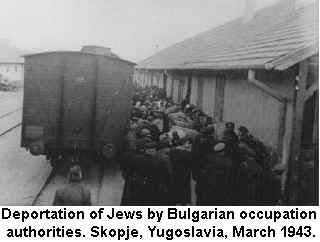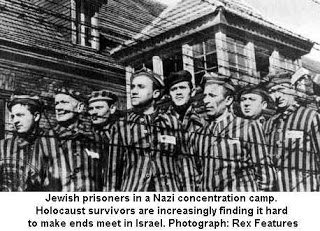Ros Dayan lives in Israel. She is a holocaust survivor. As the holocaust is commemorated in Israel, she describes how she cannot afford to pay for food or clothes in Israel – the supposed sanctuary and refuge for Jews. Her sacrifices are remembered but she herself is not. That is because the holocaust is a foundational myth for Israel – the history of the holocaust has been transformed into one long justification for the Zionist narrative – even though Zionism was the favoured child of the SS and Nazi leadership.
Ros Dayan describes her experience of the Nazis’ persecution of Jews in Bulgaria and how she survived the Holocaust. Ros is one of a growing proportion of Holocaust survivors in Israel who cannot make ends meet
‘I left a place where I suffered under a fascist regime but where a nation of people made me feel good, I came to a country of my own that makes me feel like a stranger.”
Bulgaria was unique in Eastern Europe indeed in Europe as a whole. With the exception of Denmark and Albania, it deported no Jews to the extermination camps. This wasn’t because of the kindly nature of the Bulgarian regime but because of a fierce and determined opposition of the non-Jewish population, in particular the strong Communist Party, to sending Jews to their deaths. And where the people led, the Bulgarian Orthodox Church and Archbishop Krill followed.
In the Eastern Macedonia and Thrace which were annexed from Yugoslavia and Greece Jews were deported by the Nazis, who didn’t recognise the civil administration. The Bulgarian regime was pro-Nazi and would undoubedly have deported its Jews, having brought in the anti-Semitic Law for the Protection of the Nation but the people of Bulgaria fought the police in the streets and in the end no deportations at all occurred.
As even a Zionist site admits ‘The Bulgarian Jews were relatively unreligious and did not stand apart from the local populace by virtue of garb or rites. They were relatively poor by comparison to Jews in other countries, and they lived in integrated neighborhoods. Additionally, the Bulgarians had many minorities: Armenians, Turks, Greeks, and Gypsies, in addition to Jews. There was no concept of racism in that culture. The bottom line here is that Bulgarians saw Bulgarian Jews as Bulgarians, and not as Jews. Being a small country, like Denmark, there was a closeness of community that is often missing in larger countries. So here was a bright spot that we can point to as an example of what should have been.’
This is of course another example of how non-Jewish opposition to the holocaust was far more important than Zionist nostrums of eternal hatred for Jews among non-Jews and their justifications for anti-Semitism.
Holocaust survivors struggling to make ends meet in Israel http://www.guardian.co.uk/world/2012/apr/19/holocaust-survivor-struggle-money-israel?intcmp=239
Despite the horrors of a childhood in the shadow of the Holocaust, Ros Dayan survived to build a life she could be proud of in the new Jewish state of Israel.
She trained as a nurse, she sang in a choir that toured the world. She learnt Hebrew, though she never lost her central European accent. She paid her taxes and eventually bought the tiny house in Jaffa that she had rented at a subsidised rate for years. She even learned to live with the pain of three broken vertebrae, the result of an assault by a Nazi soldier.
But, now, in the last years of her life, Ros is ashamed. One of the 198,000 Holocaust survivors still alive in Israel, she is also one of the growing proportion who cannot make ends meet, who struggle with insufficient funds on a daily basis.
Wiping a single tear with a shaking hand, she says: “For the first time, I don’t have enough money for food or clothes. I used to have pride, now I am ashamed.”
As Israel commemorates Holocaust Day on Thursday, Ros resents those who mourn the six million Jews that died without considering the penury of some of those still living. “On Holocaust Day, they make a parade, those who do not know what a Holocaust is, what hunger is. The people who suffered in the Holocaust are left behind, hungry.”
According to studies, around a quarter of Holocaust survivors in Israel live below the poverty line, struggling to pay for food, heating, housing, medication and care.
As survivors get older – almost 90% are over 75 – their resources diminish as their needs grow. Many are widowed, and a high proportion of those receiving assistance are childless. As well as basic living needs, most face expensive bills for medication, and around 20,000 need 24-hour care.
“A lot of survivors face big medical bills, and life in Israel is very expensive generally,” says Deborah Garel of the Jaffa Institute, which distributes bi-monthly food parcels to Holocaust survivors. “Holocaust survivors going hungry in Israel? This is not right. After being hungry in the ghetto, they shouldn’t be hungry in the Jewish state.”
The government is doing its best, says Garel, but many survivors do not know what their rights or entitlements are, and many are incapable or do not have the mental energy to go through necessary bureaucratic hurdles to obtain benefits.
This week, the government announced an increase in funds for the needs of survivors from 206m shekels (£34.2m) a year to 225m. It points out that, despite the overall declining numbers of people who lived through WW2, more people are being defined as Holocaust survivors according to criteria set by the government and are therefore eligible for funding.
Garel says more Israelis and Jews in other countries should contribute from their pockets for the care of survivors. “It’s the responsibility of every Jew to give to the few that are remaining. If everyone made a small annual donation, it would make a big difference.”
After Ros and her family were driven from their comfortable middle-class home in Sofia, they spent the rest of the war in extreme fear and hunger. “I never felt like a child, I never had a childhood,” she recalls. “We lived on 300g of bread a day. Potatoes were a luxury food.”
But the family were spared the death camps, and after the war they made their way by boat to the place that would soon become Israel. They landed in Haifa with few possessions and no money or valuables.
After a rocky and lonely beginning, Ros married and built a new life. Now a childless widow, she was recently forced to hire a full-time, live-in carer – a necessary expense which she simply cannot afford. She is bitter about her circumstances.
“I love this country, but I don’t feel Jewish here. I came here to feel Jewish. Every Holocaust day I’m sad for what we lost, and I’m sad I didn’t end up in a country that loves me,” she says.
The problem of impoverished Holocaust survivors is acute but not long-term. Twelve thousand survivors in Israel died over the past year, and the current rate is one death an hour.

